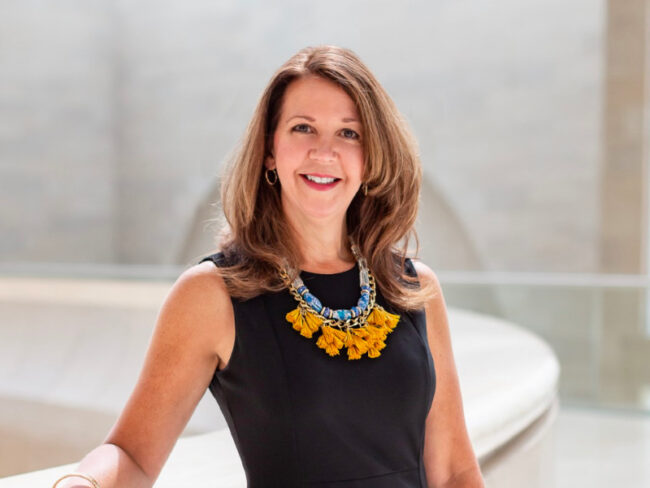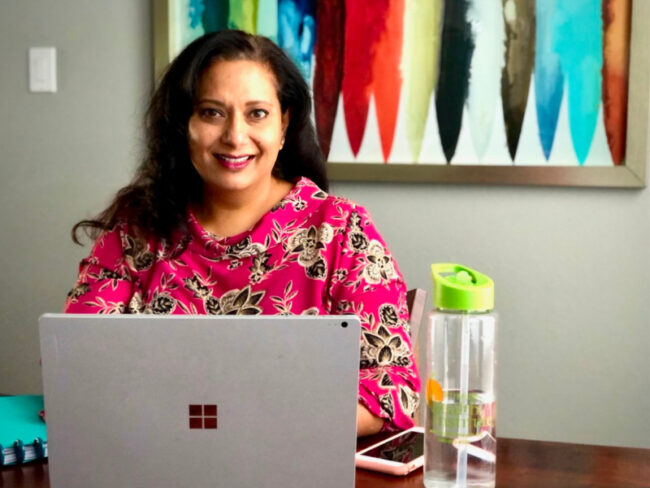It’s not always easy for women to forge career paths in business, especially right out of college. While there is plenty of advice out there about how to navigate the business world as a young woman, Cox School of Business adjunct professors Paula Beasley and Nila Sinha, both with years of professional experience, shared their secrets for what not to do:
1. Choose an easier route out of fear
When commercial real estate lawyer Paula Beasley finished law school in 1991, the economy wasn’t faring very well, so she chose to work for a solo attorney instead of working for a big law firm. She said the job gave her a mentor to look up to and provided her with exposure to viewpoints she might not otherwise have received.
After working for a one-person shop, and seeing how a solo practice ran, she ended up starting her own practice in commercial real estate law.
“That was a growing experience. I had to learn how to grow a business, start a business, and do everything myself, from answering the phones, to opening client files, to doing the billing,” said Beasley, who teaches real estate law at Cox.

Although she agrees it might have made life easier to work at a larger firm or company, she doesn’t have any regrets about the decisions she’s made and the places she’s worked.
“There are times when I was on my own that it was pretty hard, and it would have been nice to have a steady income from a law firm or from a company,” Beasley said. “But in hindsight, it did provide lots of experience.”
2. Burn bridges with other professionals
When Beasley started her practice, she did a lot of networking in business development because she didn’t have many of her own clients yet.
“I went to pretty much every networking event and trade association that was specific to commercial real estate,” Beasley said.
She said the events weren’t always fun, as sometimes they were early in the morning or across town. But some of these relationships she developed over 30 years ago are still her contacts today. And many of them have progressed in their respective careers, becoming bank presidents and leading companies, becoming ever more valuable connections in the process.
“So that effort it takes to develop business and meet people and make relationships is a lot of work and sometimes not fun, but always, always worth it,” Beasley said.
She believes that relationships are key, probably more important than anything else you’ll do in business.
“The people in Dallas, even though it’s a big town, it’s kind of a small town and word travels,” Beasley said.
3. Get discouraged when career expectations diverge from reality
Throughout her career, Nila Sinha experienced several obstacles that could have derailed her path. Sinha’s father passed away at a young age, leaving her mother to put two daughters through undergraduate and graduate school alone. Then her primary professor passed away while she was working towards her Ph.D., forcing her to start over.
Finally, Sinha was laid off from her former company after 19 years.
“You could see them as obstacles, but I think they were just forks in the road and learning moments,” Sinha, who teaches management at Cox, said. “If you expect the path to be linear, then you would see those as obstacles. If you see that it’s supposed to be winding and non-linear and double-backed, then you don’t have that expectation.”
As of 2022, employees under 24 have experienced roughly 3.8 more job changes than those over 45.

“I wish I had trusted myself and not been so panicked and anxious,” Sinha said. “Don’t feel so panicked by one door closing or about making a wrong step or a wrong direction. Trust it and go with it and you’ll end up where you’re meant to be. I wish I had known that earlier on. I don’t know that it would have changed my career trajectory, but I think I would have been happier in the process.”
4. Give too much power to what they think they should want, as opposed to what they really want
“I think there’s something in terms of yes, you want to respect your environment, your parents, and what people are telling you,” Sinha said. “However, it’s very important to go on that path of self-discovery and listen to really what you know inside about yourself and what’s going to bring you fulfillment, in terms of your work and where to pursue it.”
After 19 years with her previous consulting firm, Sinha was laid off. She said the decision was shocking, especially because it was the longest relationship she’d had, even considering the relationships in her personal life.
“Here I stayed with this company and had given so much of myself to it, and it still is a huge shock,” Sinha said. “That really made me stop and breathe and take stock of things. I was working so fast and furious on my career and moving forward and achieving according to someone else’s carrot dangling from a stick that I never stopped to consider what’s important to me.”
Soon after, Sinha started her own boutique consulting firm, Sinha Solutions. She says the firm’s style has afforded her the luxury of being able to listen to the client and truly partner with the client to determine a custom, tailored solution for them.

“I took the 20 years of external consultancy and started this boutique service of Sinha Solutions where I can sit at the same side of the table and say let me understand your needs, your problems, and what I can design to help you address that,” Sinha said.
5. Pretend to know the answer when they don’t
“If you make a mistake and you don’t know the answer, be okay to say that,” Beasley said. “You’re supposed to be well-educated and experienced in your field of practice. But people don’t expect that you know everything, and a lot of times you don’t.”
Intellectual humility is the concept of recognizing the limits of your knowledge and seeking more insight from another source. Research shows that more intellectually humble individuals are more motivated and engaged with learning.
“It’s okay to say, ‘This is what I think, but let me go look at this’ or ‘Let me check this and I’ll get back with you,’” Beasley said. “That’s a perfectly acceptable answer as opposed to making something up which may or may not be correct and that’s a bad situation to be in if it’s not correct. Own up to the fact that you’re young and inexperienced but be willing to go find the answer if you don’t know it.”
6. Assume the answer is no
“One thing I will say especially for women in their careers is you have to ask,” Beasley said.
Beasley shifted jobs from her own practice to a regional downtown firm and specifically requested a 4-day work schedule. She was the only one granted a 4-day work week, and in return, she had to give up her status as a partner.
“Our other lawyers had greater hourly commitments and obligations and would make partner sooner and that was a concession I was willing to accept in return for keeping the 4-day workweek,” Beasley said.
Since then, Beasley has shifted back to full-time work and now is a partner at Farrow-Gillespie Heath Witter LLP, a smaller, majority women-owned firm.
7. Let work dictate how to prioritize what’s important to them personally
“There’s only so many hours in the day and your kids are only going to be small for so many years,” Beasley said. “My preference is that I’m glad I chose a path that allowed me to be there when they were young. You need to do what’s best for you and your family.”
Some of Beasley’s friends that work in big law chose to not have kids and some have husbands that don’t work.
“Really there’s no one size fits all,” Beasley said. “You have to do what makes you happy and what works for you personally.”
8. Let one aspect of their past interests limit the trajectory of their future
“Things have changed in this modern work environment,” Sinha said. “Nowadays, you can have more than one career. And oftentimes you can take your interests, you can take your experiences, and you can take your work experience and combine those, and it can lead you in some different path that is a culmination of who you are, of what you experienced, of what you went to school for.”
A reported 49% of employees are happy with their current job, whereas “respected” employees are 63% more satisfied, which might suggest a positive correlation between job complexity and job satisfaction.
“We no longer need jobs where people clock in, clock out, and do assembly line because we have computers,” Sinha said. “Technology has furthered those and replaced them for the better so people can now use their minds and their passions to apply to work.”
9. Work without taking time to rest
“I think it’s important to take breaks,” Beasley said. “It’s important to be a hard worker and always learning, but I think it’s very important to have a fun vacation or have downtime.”
While 10 days is the average paid time off given for the private sector in the U.S., the average unused paid time off in 2021 was 4.6 days.
“I pretty much try not to work on Saturdays,” Beasley said. “Even if I’m really busy, I’ll do it Sunday. Just so that you have some rest in between, otherwise you get burnt out.”
A reported 52% of business owners have not taken a vacation in the past year and two-thirds of U.S. workers feel “at least moderately burned out.”
10. Let other people limit their own potential
“I have seen a pattern where women often have this voice, there is this ‘I have to earn my place at the table. I need permission.’ Maybe this secret fear that they are not enough,” Sinha said. “And you can even hear that in the way they talk.”
An article by Harvard Business Review examines the reasons why female entrepreneurs are less successful than their male counterparts in VC pitching. One reason highlights the confidence gender gap, in which women tend to undervalue themselves compared to men, which comes off to potential investors as “less sure of themselves.”
“I never hear from the men that are thinking about being an entrepreneur of ‘Well I don’t know if I know enough, I don’t think I have enough.’ I rarely hear that,” Sinha said. “I hear that much more from the women. And frankly, a lot of the times the women are more qualified in their experiences, they just don’t believe they are.”
Paula Beasley is a commercial real estate lawyer and partner at Farrow-Gillespie Heath Witter LLP. She teaches Real Estate Law (RE 4338) at SMU Cox School of Business and is currently Immediate Past President of CREW (Commercial Real Estate Women) Dallas. She has been listed on D Magazine’s “Best Women Lawyers in Dallas” and “Best Lawyers in Dallas under 40” and Best Lawyers’s “Best Lawyers in America.”
Nila Sinha is the founder of Sinha Solutions, a boutique consulting services firm specializing in the design and delivery of selection and talent development solutions. She has worked with clients such as Travelers Insurance, 7-Eleven, Comcast, American Airlines, and BNSF in designing and validating customized selection systems and implementing leadership development programs. She received her Ph.D. in Industrial/Organizational Psychology at Florida International University and teaches Management in Action (MNO 6238) at SMU Cox School of Business.















